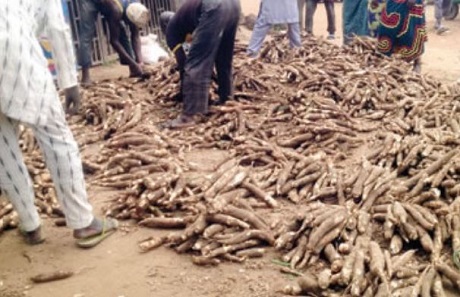Hot Stories
Recent Stories
FG Raises Alarm Over New Cassava Brown Streak Disease
Posted by Victor on Fri 19th Jul, 2019 - tori.ngThe Ministry of Agriculture and Rural Development said that the disease had caused over 90 per cent loss in a cassava farm in the country.

Yam cultivation
The Federal Government has raised an alarm over a recent virile disease, Cassava Brown Streak Disease (CBSD), ravaging East and Central Africa now making its way to West Africa.
Dr Muhammed Umar, the Permanent Secretary, Ministry of Agriculture and Rural Development, disclosed this on Thursday in Abuja at the 2019 Cassava Investment Forum.
The Permanent Secretary represented by Mr Ayodeji Bobby, Head, Font and Tuber Crops in the ministry called for a collective effort in securing Nigeria and the West African region against the virus.
He said that the disease had caused over 90 per cent loss in a cassava farm in the country.
He, therefore, urged the professionals at the cassava forum to use their vast knowledge and experience to advise the ministry on areas that were key to the development of cassava sub-sector in Nigeria.
The permanent secretary said that Nigeria remained the largest producer of cassava, adding that a total of 36.8 million matric tonnes of cassava were harvested from 3.13 million hectares in 2013.
He said that this was with an average yield of 11.7 tonnes per hectare, adding that this, however, accounted for an insignificant fraction of global value-addition of cassava.
“But because of the Federal Government support through the change agenda of the government raised the production to about 54 million metric tonnes at 15 tonnes per hectare and develop efficient value-added chains.’’
Umar said that this was for high-quality cassava flour, dried chips; starch and sweeteners; ethanol and traditional foods.
He said the ministry in collaboration with the organisers of the investment forum, the Federal University of Agriculture Abeokuta (FUNAAB/CAVA) trained master bakers on the promotion and adoption of 20 per cent cassava bread.
Umar said that the Federal Government provided them with working equipment and capital to create local sustainable markets for cassava and generate employment.
He said that the IITA also provided research on products and good quality stems to the farmers.
Dr Afred Dixon, IITA Director for Development and Delivery said that Nigeria’s cassava annual production was above 50 million tonnes, adding that the increased from 35 million tonnes in the early 90s was not by accident.
He said that this resulted from stakeholders in research development to all other aspects of cassava value chains such as processing, mechanisation, and markets.
Dixon said that in spite of the achievement of having more than 50 million tonnes annual production, there were some challenges still confronting the cassava crop.
“Our yield per hectare is still low, it is less than 10 tonnes per hectare, we are still battling with the problem of cyclical glut, there are still processing challenges.
(NAN)
Dr Muhammed Umar, the Permanent Secretary, Ministry of Agriculture and Rural Development, disclosed this on Thursday in Abuja at the 2019 Cassava Investment Forum.
The Permanent Secretary represented by Mr Ayodeji Bobby, Head, Font and Tuber Crops in the ministry called for a collective effort in securing Nigeria and the West African region against the virus.
He said that the disease had caused over 90 per cent loss in a cassava farm in the country.
He, therefore, urged the professionals at the cassava forum to use their vast knowledge and experience to advise the ministry on areas that were key to the development of cassava sub-sector in Nigeria.
The permanent secretary said that Nigeria remained the largest producer of cassava, adding that a total of 36.8 million matric tonnes of cassava were harvested from 3.13 million hectares in 2013.
He said that this was with an average yield of 11.7 tonnes per hectare, adding that this, however, accounted for an insignificant fraction of global value-addition of cassava.
“But because of the Federal Government support through the change agenda of the government raised the production to about 54 million metric tonnes at 15 tonnes per hectare and develop efficient value-added chains.’’
Umar said that this was for high-quality cassava flour, dried chips; starch and sweeteners; ethanol and traditional foods.
He said the ministry in collaboration with the organisers of the investment forum, the Federal University of Agriculture Abeokuta (FUNAAB/CAVA) trained master bakers on the promotion and adoption of 20 per cent cassava bread.
Umar said that the Federal Government provided them with working equipment and capital to create local sustainable markets for cassava and generate employment.
He said that the IITA also provided research on products and good quality stems to the farmers.
Dr Afred Dixon, IITA Director for Development and Delivery said that Nigeria’s cassava annual production was above 50 million tonnes, adding that the increased from 35 million tonnes in the early 90s was not by accident.
He said that this resulted from stakeholders in research development to all other aspects of cassava value chains such as processing, mechanisation, and markets.
Dixon said that in spite of the achievement of having more than 50 million tonnes annual production, there were some challenges still confronting the cassava crop.
“Our yield per hectare is still low, it is less than 10 tonnes per hectare, we are still battling with the problem of cyclical glut, there are still processing challenges.
(NAN)
Top Stories
Popular Stories
Stories from this Category
Recent Stories
















































